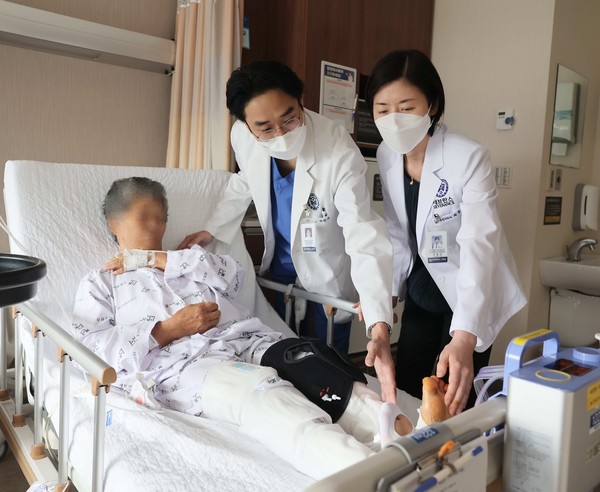Severance Hospital has introduced an early recovery program for people who receive an artificial knee joint surgery by reducing their pains and shortening the recovery period, the hospital said Friday.

Doctors consider artificial knee joint surgery for severe degenerative knee arthritis patients. The surgery has proved its safety and efficacy in restoring joint function. However, rehabilitation usually takes a long time as patients suffer from severe pain after surgery.
To rectify the problem, a group of orthopedics and anesthesiologists at the hospital have adopted the “enhanced recovery after surgery (ERAS),” an early recovery program to reduce patients’ pain and enhance recovery.
The ERAS program consists of four elements: shortening the fasting period and ingesting carbohydrates on the morning of surgery; having peripheral nerve blocks surgery; reducing the amount of blood transfusion; and having early rehabilitation to increase exercise ability.
Besides, doctors also strive to enhance recovery and minimize complications by prescribing antiemetics, irons, and styptics to patients and guiding them to stop smoking and drinking.
The program is a collection of the clinical know-how of many clinical departments and divisions, such as orthopedics, anesthesiology, rehabilitation medical treatment, nurses, and nutritionists, as it integrates the medical treatment previously carried out by individual clinical departments, according to the hospital.

Developers of the ERAS program -- Professors Park Kwan-kyu and Kwon Hyuck-min of the Orthopedics Department and Professors Choi Yong-seon and Lee Bo-ra of the Anesthesiology Department -- have won recognition for its excellent treatment effect by presenting related study results of the program.
For example, the research team said in the Journal of Clinical Medicine (with an impact factor of 4.96) that there was a significant effect from nerve block surgery compared to pain self-regulating device, the traditional pain control method by continuously injecting pain killers into the vein.
They also published the research results on the surgical method. They optimized part of the nerve block on the Regional Anesthesia and Pain Medicine (IF 6.29), revealing that blocking the nerves in the distal end of the adductor muscle reduced the most pain than in other parts of the quadriceps femoris muscles.
In addition, the professors found that ingesting carbohydrate drinks during surgery prevented adverse effects leading to enhanced recovery after general anesthesia.
“The ERAS program in the field of artificial joint surgery field is the combined results of Severance Hospital’s clinical capacity based on the interdisciplinary treatments of various departments,” Professor Park said.
Professor Choi said, “We will do our best to upgrade the program to help minimize patients’ pains and advance their recovery.”

